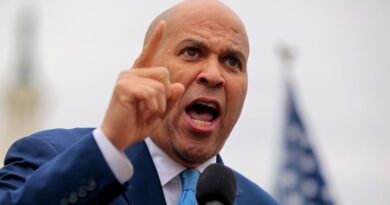‘Politics Explained’: Is Biden or Trump to blame for inflation? And how will Harris or Trump change the economy?
Inflation has been a central concern for voters in the upcoming election, with many pointing fingers at President Joe Biden and Vice President Kamala Harris. But is it fair to blame them entirely for the rising cost of goods? The answer, like the causes of inflation itself, is complex.
Although inflation is currently at its lowest since March 2021, many families continue to struggle with higher prices. News stories and social media show some voters blaming the Biden-Harris administration for costs rising. On this week’s episode of “Politics Explained,” we look at the theories about inflation that take into account that inflation just didn’t start with one president.
During former President Donald Trump’s administration, Trump often boasted about low unemployment and economic growth, much of which was inherited from the Obama administration. However, Trump’s decision to engage in trade wars, particularly with China, led to tariffs that disrupted supply chains and, in some cases, led to higher prices for consumers.
Then came the 2020 COVID-19 pandemic, which severely disrupted global supply chains and led to sharp price increases. As travel restrictions and labor shortages mounted, inflation skyrocketed, exacerbating the economic downturn.
In response to the pandemic, the U.S. government took significant steps to stabilize the economy. Trump signed the bipartisan CARES Act in 2020, providing relief funds to millions of Americans. However, some economists theorize that the surge of cash flowing into the economy, coupled with limited supplies, fueled demand and contributed to rising prices. When Biden took office in 2021, the economy was still reeling from the pandemic’s aftermath. His administration went on to sign another stimulus package, despite concerns about inflation.
Global factors such as the war in Ukraine and corporate price gouging also played significant roles in inflation. Companies that saw record profits during the pandemic often kept prices high even when supply chain disruptions eased. Despite this, many Americans looked to President Biden to solve the problem — but they also blamed him, too.
Historically, U.S. presidents have been blamed for inflation and economic downturns, even when their control over them was limited. In the 1970s, President Jimmy Carter faced severe criticism for high inflation (and his “malaise speech,” contributing to his loss to Republican candidate Ronald Reagan. Similarly, George H.W. Bush lost his re-election bid to Bill Clinton due to a recession in the 1990s.
So what have Joe and Kamala done about inflation?
The Biden-Harris administration has taken steps to combat inflation. In 2022, President Biden authorized the release of oil reserves to lower gas prices, passed the Inflation Reduction Act and supported the Federal Reserve’s decision to raise interest rates to slow spending. However, whether these measures will alleviate voters’ concerns remains to be seen.
As the 2024 election approaches, both Harris and Trump have presented their economic plans. Trump promises more tariffs, which economists warn could further drive up inflation. Harris, on the other hand, pledges to support middle- and lower-income families with tax breaks and address corporate price gouging.
In the end, voters may not only judge candidates based on who does more to fix the economy but also on who tells the most convincing story about their efforts to do so. The debate over presidential responsibility for inflation is as much about perception as it is about policy.
With the election around the corner, the public will soon decide whose narrative they trust more.




